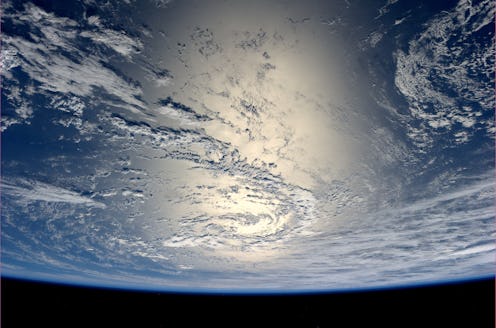Life
An Asteroid Came Super Close To Earth While We Were All Distracted By Beyoncé At Coachella

Not that we don't have enough impending apocalyptic doom to worry about, what with the threat of nuclear annihilation a slight possibility these days, but here's something new to keep you up at night: an asteroid flew frighteningly close to Earth on Sunday morning, and scientists spotted it only a few hours before it could have collided with us. Even the folks in the 1998 film Deep Impact had some time to prepare for certain death by comet.
As reported by EarthSky.org, scientists at the Catalina Sky Survey in Arizona spied the asteroid 2018 GE3 on Saturday, April 14th. Just a few hours later, at 2:41 a.m. EDT on April 15, the asteroid was a mere 119,500 miles from Earth — in comparison, the moon is about 250,000 miles from Earth, so this was a fairly close call.
EarthSky reports that the asteroid was about 157 to 361 feet in diameter, which makes it significantly larger than the infamous Chelyabinsk meteor that exploded over Chelyabinsk, Russia in February 2013. Later that year, The Guardian reported the Chelyabinsk meteor, which was about 20 meters wide, began to shatter when it entered the Earth's atmosphere, causing massive chunks of space rock to rain down upon the million-plus population city. At least 1,210 people were injured, but there were no immediate fatalities, although many buildings suffered damage in the explosion.
Since asteroid 2018 GE3 is about six times the size of the Chelyabinsk meteor, if it entered our atmosphere, the damage could have been extensive. Generally, asteroids break up when they enter our inhospitable atmosphere, and as EarthSky points out, they do head our way undetected more often than you'd think, which is sort of comforting. But an asteroid as large as 2018 GE3 could cause problems, assuming even a few chunks manage to survive the descent. Earth hasn't been spared every asteroid impact, a number of which have left permanent scars on the planet. According to National Geographic, the Vredefort Crater in South Africa, for instance, was caused by an asteroid hit two billion years ago; as was the Sudbury Basin in Ontario, Canada.
The Chicxulub Crater in the Yucatán peninsula in Mexico was formed from an asteroid hit a fairly recent estimated 65 million years ago, and the Chesapeake Bay Crater in Virginia is practically brand new, having been created by an asteroid hit a mere 35 million years ago. That crater is located pretty close to Washington, D.C., so you can imagine the panic it would have caused had humans existed/had Twitter at the time.
I've often thought, thanks to historical documents like the Bruce Willis film Armageddon, that science would bless us with adequate warning should a devastating asteroid come too close to Earth, so we'd have plenty of time to empty out all the Trader Joe's aisles and bunker down with all 15 seasons of ER to keep us occupied until it's safe to go outside. I imagine, at that point, the Earth will look much like it did in WALL-E, which is depressing, but at least they still had the Hello, Dolly soundtrack.
Unfortunately, science is imperfect, and asteroids can and probably will hit us with little warning. Live life to the fullest! Carpe Diem! YOLO! Watch all of ER now, before you don't have the chance to find out if Dr. Carter manages to overcome his debilitating drug addiction and win over Maura Tierney! I'm sure the dinosaurs had a lot of unfinished business to attend to when they were wiped out, so don't be like them! Munch on that branch you've been eyeing for years, or turn the Triceratops of your dreams into a delicious meal before the end times come. The world is your soon-to-be-destroyed oyster, after all.